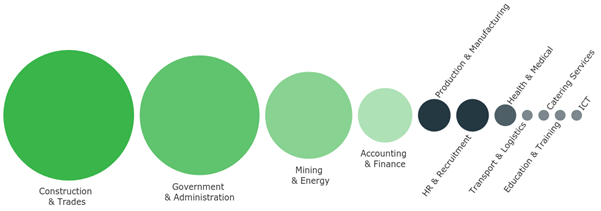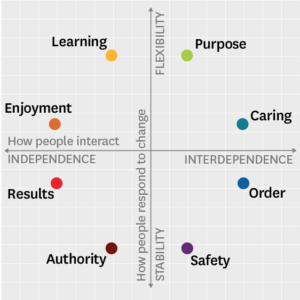23 – The human factor in recruiting

This week we’re going beyond the job description into workplace culture. Here’s a great example of what we’re talking about …
In 2006, David Bardos, an international trade manager, and his wife Jane, a teacher, were working 15-hour days in the Philippines.
“It seemed like we were always at work and it felt like we were going to miss our kids growing up, says David.
“So, we made a ‘career’ decision for the family. We looked at the lifestyles of countries around the world and chose regional Australia; and we’ve never looked back.
“The biggest reward for all of us is time. Time to enjoy life with each other, time to spend with friends, time to contribute to our local community. My wife teaches English as a second language. My daughter is involved in fundraising and is studying commerce and media. My son is a member of the Australian Air Force Cadets and PCYC Emergency Cadets and looking to pursue a career with the Australian Defence Force.
“And me, well I’m loving my job as business development manager in Murray-Riverina for Port of Melbourne, linking regional agribusiness with export markets and keeping the supply chain moving for local produce.”
Spinifex Group Manager, Damien O’Donnell explains: “David was one of the first skilled migrants we helped to recruit in the Riverina and a great example of the human factor in recruitment.
“This wasn’t just about David seeking a career change, it was about wanting a different lifestyle for his family, so his motivation went beyond just finding a job.
“It was also about workplace culture fit. Some people have skills and knowledge that tick all the boxes on a job description, but recruitment must go beyond the job description. You have to consider how well a candidate can fit in and be happy in a workplace culture and form the relationships they need to be productive.
“Taking all those human factors into account, this job was a perfect match between David and Port of Melbourne.
“We’re so proud to see David now, 10 years on, being so highly regarded across the region for his work in keeping exports moving from the Riverina to Port Melbourne and around the world.”
What jobs are out there?
Over the past few weeks we’ve listed a number of opportunities in the following industries and locations.

Where the jobs are
| Albury | Manildra |
| Ballina | Orange |
| Bathurst | Parkes |
| Blayney | Parramatta |
| Byron Bay | Sydney |
| Dubbo | Tweed Heads |
| Lismore | Wagga Wagga |
For more information, take a look at our current job opportunities
Going beyond the job description
Whether you’re looking for someone to fill a position in your organisation, or looking for a job, understanding the workplace culture (and the relationships which fuel that culture) can help you understand what the role requires beyond skills and knowledge

Source: https://hbr.org/2018/01/the-leaders-guide-to-corporate-culture
A study published in Harvard Business Review in 2018 showed eight distinct cultures at work that span two dimensions:
| HOW PEOPLE INTERACT |
HOW PEOPLE DEAL WITH CHANGE |
|
From Independently favouring individuals thriving on their own and competition To Interdependently favouring group effectiveness |
From Stability favouring rules and hierarchies To Flexibility favouring innovation and diversity of thinking |
Organisations don’t just fit into one culture, and no single culture is right or wrong, but understanding the workplace culture(s) can help leaders understand how their organisation functions and what drives employee engagement, productivity, satisfaction and, ultimately, retention.
So, what is workplace culture?
It’s the environment created, either purposefully or organically, by an organisation for its employees.
You can see it in how people behave and talk to each other, from decision making and how they treat each other to the stories and legends they share.
It’s the mix of things (leadership, values, beliefs, traditions and all the life experiences each employee brings to the workplace) that shape how actual work gets done.
The end result is all the unspoken-unwritten rules and unconscious thoughts that drive ‘the way things work around here’.
Why does matter?
When employees’ goals, needs and values are aligned with their workplace culture, otherwise known as ‘culture fit’, employers experience higher levels of:
- Commitment to the organisation and its performance
- Productivity
- Market competitiveness
- Job satisfaction
- Engagement (how people feel about the way things work around here)
- Respect
- Relationships that enable effective communication, collaboration, supportiveness
- Motivation
- Innovation
- Retention
- Attraction of new employees
So, it’s no wonder that 92% of leaders from companies who participated in a 2019 Dale Carnegie Institute survey, believe that workplace culture and financial performance are closely interrelated
How does ‘workplace culture’ fit in with recruitment?
Skills and competencies are important, but they can be taught. So, it is important, when recruiting, that you also consider human factors such as:
- What impact your workplace culture will have on a candidate
- What impact the candidate will have on your workplace culture
When you hire for both skills and cultural fit, you’ll find that your new recruits:
- Are faster to start becoming part of your team
- Start contributing quicker than others
- Are happier in their new role
- Tend to stay longer with your business
- Are more likely to become ‘star performers’ and ‘brand ambassadors’
Find out more about topics covered in this update:
- The leader’s guide to corporate culture
- What makes up your company culture
- Culture versus employee engagement
Find out more about topics covered in this update:
- The leader’s guide to corporate culture
- What makes up your company culture
- Culture versus employee engagement
Next time, we’ll cover how you use workplace culture thinking in your recruitment process and the pitfalls to avoid.
Until next week, stay safe.
| Scott C Small | Victoria Bila |
| Managing Director | Group Manager – Operations |
| Andrew Egan | Damien O’Donnell |
| Group Manager – Regional Operations | Group Manager – Regional & Executive |
Download PDF version of this update
